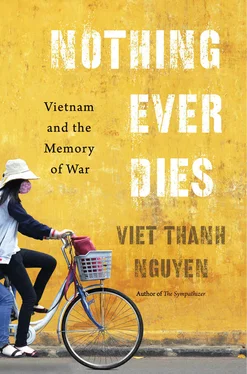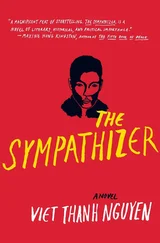Thus, while Ricoeur assumes that ethical memory is always oriented toward justice and the other, he avoids the question of what happens when competing claims to justice exist. Competing claims to justice always exist in regard to any contested event, such as war and its aftermath, but Ricoeur is not explicit about adjudicating justice, or at least the dirty, impure, pragmatic justice that actual others may care about. He is also silent on another, related question: if we deem some memories to be ethical, then must conflicting ones be unethical? Many on opposing sides of memory, presumably most, consider themselves ethical in regards to their remembrance of the past, although such subjective feeling does not mean they are indeed ethical. Implied in Ricoeur, and more explicit in Levinas, is the idea that these worldly claims to ethics and justice among actual others belongs in the realm of what Levinas calls “totality.” War, violence, and self-interest rule in totality, which is where we struggle for “freedom” at the expense of the other, whom we wish to turn into the “same.” 11For Levinas, the face of the Other belongs to “infinity,” 12where “the force of the Other is already and henceforth moral.” 13For Levinas and Ricoeur — and for Butler, too, who draws from Levinas — the ethical orientation and meaning of justice is not in dispute, for ethics and justice are always oriented toward others and an always-vanishing otherness, not toward the self or the same. 14
The uncompromising, ethical demand for justice is inspiring and points toward the utopian horizon of a time when reconciliation, hospitality, and peace — all without limitations or compromises — is possible. But as Levinas says, and as Derrida says after him, and as so many of Derrida’s followers have repeated, that time is a future always yet “to come,” arriving under the sign of the Other. 15What is to be done in the present, with actual others, where the struggle over ethics and justice is often tied to people’s deeply rooted sense of past recriminations, where any ethical achievement will be inevitably compromised, where any act of justice has a limit, where small wars and total war continue to be fought? In this worldly realm of totality, many feel that they are the ones for whom justice needs to be done, even if they are the ones who invaded, conquered, or occupied. An ethics of recognition aims not only at the utopian world of infinity but also at this disagreeable and dirty world of totality, toward what the self has done, and the conditions that make those actions possible. Recognition draws on the visual language that Levinas uses when he thinks of ethics as optics, a way of seeing anew — in this case, seeing what we are capable of as individuals and collectives, given our role in creating the conditions for individual action. Without the latter kind of panoramic recognition, what Butler calls a reframing and what one might colloquially call seeing the bigger picture, the danger is that blame and responsibility would fall only on the self and the individual, rather than on societies, cultures, industries, states, and war machines.
Nevertheless, ethical recognition is oftentimes intimate rather than panoramic, explicitly about individuals, beginning from face-to-face confrontation, particularly at the moment of violence. Ethical recognition’s visual dimension is matched by trauma’s visual shock, the sight of horrible things leaving trauma “stored there in your eyes,” as Michael Herr says. 16The killer, or even the witness to killing, is traumatized by the act of killing, especially the most intimate kinds where the victim’s face can be seen. Long-distance killing by artillery and missiles does not have the commensurate effect on gunners, pilots, and bombardiers as killing someone with a knife, a gun, or perhaps a drone, when the killer can see the face of the one being killed. 17The face of the other returns to haunt the killer, as in Novel without a Name , where Duong Thu Huong describes how the war dead “would never leave us, those faces … accusatory, demanding justice.” 18Perhaps that is why, in the republican cemetery outside of Saigon, somebody scratched out the eyes and faces of the South Vietnamese dead.
As for rape, it cannot be conducted except on face-to-face terms, which is one reason why it is traumatic for its victims, and perhaps for its perpetrators; it’s hard to say about the latter, since so few admit to rape, while many will admit to killing. The admission to rape is one of the most striking and disturbing parts of Larry Heinemann’s Close Quarters . Claymore Face’s nickname is telling, especially if we think, as Levinas does, that “violence can only aim at a face.” 19Her acne-scarred visage is ruined as if blasted by a claymore mine, an antipersonnel device that spews deadly bursts of pellets. Already defaced by the Marines through the image and language of her nickname, she will be defaced again by their choice to orally rape her. What happens to her, and what the reader feels about her fate, illustrates the claim by Levinas about the face “making murder possible and impossible” (we could substitute rape for murder, since rape is a violent act on a continuum with murder). 20On the one hand, her name evokes the face of the other as it incites the murderous, sexual, and industrial violence of the American military machine, embodied in the claymore mine and the Marines. On the other hand, her face should make murder or rape impossible, at least for those readers who feel rage, grief, or at least discomfort at what they have witnessed. That the face of the other makes murder and rape both possible and impossible shows that we who see the other as human or inhuman are ourselves both human and inhuman. We are tempted to identify with the other and also to eliminate the other, the two impulses able to exist in the same person, and certainly in the same culture.
The tendency to remember only the just, ethical part of ourselves that identifies with the other, and forget the unjust, unethical part which would kill the other, can be seen in yet another comforting cliché of memory: “The struggle of man against power is the struggle of memory against forgetting.” 21Milan Kundera’s oft-quoted words are a beautiful statement concerning the human will. Everyone who agrees with Kundera identifies with man and memory against power and forgetting. The opposition, however, is false, beginning with its separation of man from power, with man on the side of “memory,” while power is interested in “forgetting.” Perhaps true power does not reside with any individual, as the philosopher Michel Foucault claims, instead circulating beyond the grasp of any individual, so that “power is everywhere.” 22But even on Foucault’s terms, man as a whole is inextricably intertwined with power. Notions of man or humanity are constituted through power, through the ability of some to claim their humanity (while denying the humanity of others). Outside of Foucault’s concerns, individuals do commit acts of power, and the state or the group that abuses power and wishes to erase the traces of its abusiveness is composed of individuals. Man, individual or collective, is just as interested in forgetting what he has done as he is in remembering what was done to him. And the powerful are not only interested in forgetting whom they have abused but also in remembering what they have accomplished. Man is ever and always implicated in power, and no one is innocent except the infant and the most abject victim. Power must be used, and the only question is whether it will be used ethically. Kundera’s epigram turns power into something that can only be abused, even as it foregrounds the struggle against power, which can itself only be a form of power. Rather than retreat from our implication in power, we should consider exercising power as a necessary action in need of ethical principles that look beyond the idealizations of heroes and villains, good and bad, and us and them. With neither ethical principles nor an awareness of our implication in power, we are tempted, as in Kundera’s epigram, to take up the humanist cry of remembering humanity against an inhuman state, conveniently forgetting that an inhuman state would not exist without the inhumanity within man, and vice versa. The state, of course, is us.
Читать дальше












